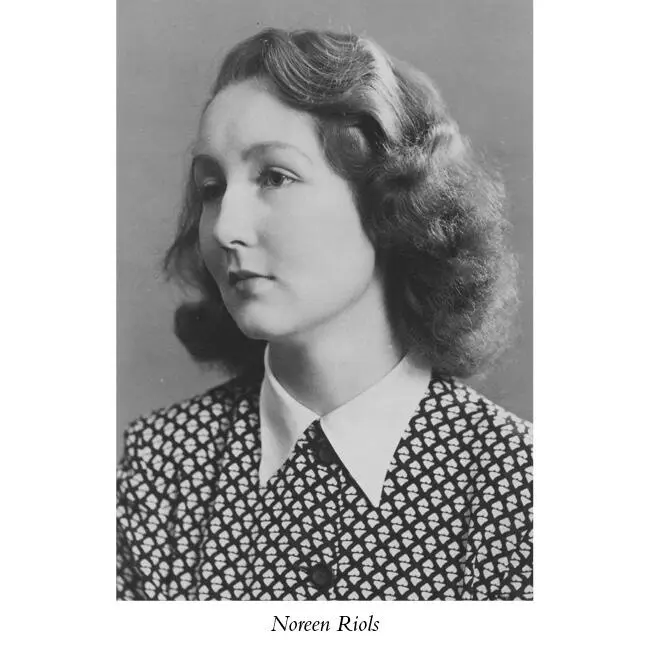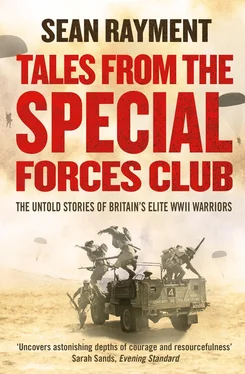SOE’s primary role was to help organise the French Resistance into a fighting force capable of mounting sabotage, with the primary targets being the rail and telephone networks.
‘Isn’t it funny that now that there are so few of us left we are in more demand than ever?’ Noreen adds before returning to her seat. ‘Now tell me, what do you want to know? There are no secrets any more.’
* * *
Noreen Riols was born into a naval family on the Mediterranean island of Malta. From an early age she had decided that she too wanted to lead an adventurous life which would begin with taking a degree at Oxford. War broke out before she was ready to go to university, but she was already becoming a capable linguist at the Lycée, the French school in South Kensington.
 ‘The plan was this: before the war I had wanted to go to Oxford, take a degree in literature, then I was going to study medicine, then I was going to astound the world with my incredible medical knowledge and then I was going to marry a tall, dark handsome man, who would whisk me off to a thatched cottage in the country, which was suitably staffed and had a pony paddock, and then I was going to have six children, all boys with red hair. I had arranged the whole thing; the only thing I hadn’t arranged was the bridegroom, but that was a detail which could be sorted out later – then the war came.
‘The plan was this: before the war I had wanted to go to Oxford, take a degree in literature, then I was going to study medicine, then I was going to astound the world with my incredible medical knowledge and then I was going to marry a tall, dark handsome man, who would whisk me off to a thatched cottage in the country, which was suitably staffed and had a pony paddock, and then I was going to have six children, all boys with red hair. I had arranged the whole thing; the only thing I hadn’t arranged was the bridegroom, but that was a detail which could be sorted out later – then the war came.
‘The Lycée was evacuated early in the war, but a few girls remained in one class and I was one of those – but I can’t remember doing any work at all and I seemed to spend the whole of my life tearing around South Kensington on the back of a Free French airman’s motorbike.
‘Life in London at that time was pretty dreadful because it was being bombed all the time and people were being killed, as you would expect, but I don’t think we, girls of my age, ever realised how much danger we were in.
‘I remember being in the Lycée when it was bombed in 1941. The school had been occupied by the Free French Air Force, and one day I heard a plane coming over and I’d just looked out of the window very excitedly when suddenly a French airman leapt on top of me and both of us were flat on the floor. Seconds later the bomb exploded and the window came crashing in. If he hadn’t knocked me to the floor I would have been seriously injured or worse. That’s why I say I don’t think we really had any appreciation of the danger we faced daily. I don’t ever remember being frightened – I don’t think you do get frightened when you are young.’
‘I got my call-up papers when I was 18. The papers said that either you joined the armed forces or you go and work in a munitions factory, but the idea of working in a munitions factory did not appeal to me in the slightest.
‘All of my friends knew that we were going to be called up when we reached 18, and I thought I’ll follow in my father’s footsteps and I’ll become a member of the Women’s Royal Naval Service, WRNS. I thought the hat was very stylish and I could see myself in the uniform. But when I went to join up I was told that the only vacancies for women in the Royal Navy were for cooks and stewards, and the idea of making stew or suet pudding for the rest of the war was not the Mati Hari image I wanted to give to the waiting world, so I declined.
‘My instructions were to report to a Labour Office somewhere in west London and when I was told by the female clerk behind the counter what my options were I said, “I’m not doing that or that,” and frankly this woman wasn’t having any of it, she got a bit ratty and said, “Make up your mind – it’s this or that, and if you can’t make up your mind I’ll put you down for a factory.”
‘Well, you can imagine how I felt, and I started to cause a bit of a fuss and said, “I will not work in a factory,” and stamped my feet and so on. At which point a door opened and a slightly irritated man looked out and said: “OK, I’ll take over this one.” He then proceeded to ask me a lot of questions which had nothing to do with the warship I intended to take charge of.
‘He then picked up on my schooling and said, “I see you went to the Lycée. You speak French?” I said yes, and then he started speaking to me in several different languages. He was leaping about from one to another like a demented kangaroo and he seemed quite surprised that I could keep up with him in French, German and Spanish. After the interview he sent me to the Foreign Office, where I was ushered into a windowless room, where again I was questioned by a high-ranking officer. Of course I had no idea what I was being interviewed for at that stage, but looking back I think there was obviously some kind of liaison between the Lycée, the SOE and the Labour Office. At that stage there was a requirement for people who could speak languages to carry out secret work – but it’s not the sort of thing you can advertise for.
‘After that interview I ended up at 64 Baker Street, the headquarters of SOE, but I had no idea where I was or what the building was for or the work they were doing. It was at Baker Street that I met Colonel Maurice Buckmaster, who was a major then and was in charge of SOE’s French section.’
The SOE recruited people from all walks of life, with the primary requirement being a thorough knowledge of the country in which the agent was to operate. Fluency in the native language was vital, especially French for those entering France; thus exiled or escaped members of the armed forces of various occupied countries proved to be a fertile recruiting ground. Agents needed to be both ruthless and diplomatic, callous enough to slit a man’s throat or execute an informer, while also able to master the politics of, say, the French Resistance movement and motivate members of it accordingly. Training was tough and, as we shall see later in the chapter, trainees could be failed at any stage.
While Baker Street was the main headquarters, the organisation’s various branches and departments were strewn across London and much of England. Wireless production and research departments were based in Watford, Wembley and Birmingham. The camouflage, make-up and photography sections, Stations XVa, XVb and XVc, were largely based in the Kensington area of west London. Station XVb, a camouflage training base and briefing centre, was located in the Natural History Museum. In addition to the various stations there were over 60 separate training centres across Britain, where agents would be taught a wide variety of field skills, including demolition, sabotage and assassination techniques.
Station XV – The Thatched Barn – was one of the most important establishments within the SOE. It was a two-storey mock-Tudor hotel built in the 1930s in Borehamwood, Hertfordshire, and had been acquired by Billy Butlin, the holiday camp entrepreneur, before being requisitioned by SOE.
The Thatched Barn was the place where agents would be kitted out with clothing and equipment which was appropriate for the country in which they were about to infiltrate. Every item of clothing had to be an exact fit with what was expected for that particular country, or even region. So if the French in Brittany, say, stitched hems in a particular way, then that method needed to be used when fitting clothes for an agent about to be sent to that region. Nothing could be left to chance.
‘At the time the headquarters was called the Inter-Allied Research Bureau – well, that meant absolutely nothing to me, as you can imagine. I was hopping from one office to the other. Buck sent me to another office and said this captain is expecting you – and he may have been, but by the time I’d got there he’d forgotten that he was meant to be interviewing me. He looked at me as though I had walked in from outer space and then said, “Nobody, but nobody must know what you do here. That includes brothers, sisters, aunts, uncles.” Then an immensely tall man called Eddie McGuire, an Irish Guards officer, shot into the room making very funny, squeaky sounds. It really was quite a bizarre scene. Then the two of them suddenly stopped talking and ran out of the room and down the corridor. I wondered where I was – I was only just 18 at the time and it felt like I was in a lunatic asylum being run by the Crazy Gang.
Читать дальше

 ‘The plan was this: before the war I had wanted to go to Oxford, take a degree in literature, then I was going to study medicine, then I was going to astound the world with my incredible medical knowledge and then I was going to marry a tall, dark handsome man, who would whisk me off to a thatched cottage in the country, which was suitably staffed and had a pony paddock, and then I was going to have six children, all boys with red hair. I had arranged the whole thing; the only thing I hadn’t arranged was the bridegroom, but that was a detail which could be sorted out later – then the war came.
‘The plan was this: before the war I had wanted to go to Oxford, take a degree in literature, then I was going to study medicine, then I was going to astound the world with my incredible medical knowledge and then I was going to marry a tall, dark handsome man, who would whisk me off to a thatched cottage in the country, which was suitably staffed and had a pony paddock, and then I was going to have six children, all boys with red hair. I had arranged the whole thing; the only thing I hadn’t arranged was the bridegroom, but that was a detail which could be sorted out later – then the war came.










